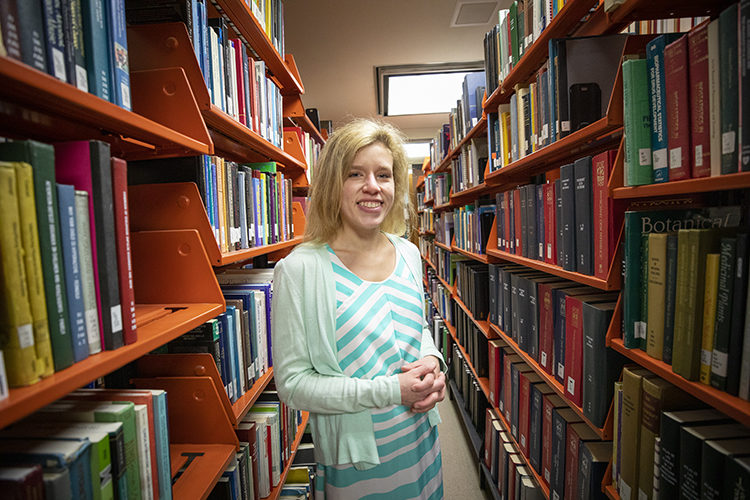Even though about 19% of the population experiences mental health issues, according to the National Alliance on Mental Health, there is still a stigma attached to mental health in some communities.
And mental health may be an even bigger issue among librarians. One study found that more than half of academic librarians surveyed reported having a diagnosed mental illness. But these mental illnesses are scarcely discussed in the library community, said Abigail Phillips, assistant professor in the School of Information Studies.
There is an “emotional labor” that comes with being a librarian, Phillips said. Libraries are a refuge for stressed community members, the homeless and the mentally ill, she said, and librarians must constantly face these challenges.
After a while, putting on a friendly face can take a toll on the librarian’s own mental health, Phillips said.
“We’re not trained as therapists or social workers,” Phillips said. “You’re expected to be super bubbly and upbeat, and you can only fake that for so long until you break.”
Experiencing the effects
Because of such a demanding work environment, many people in the library community, from librarians to library and information studies (LIS) professors and students, experience burnout, weight loss and generally poorer mental health, Phillips said.
“We’re not really taught how to manage our own mental health, or it’s not even spoken about. How do you deal with all these feelings that people are throwing at you?”
Phillips provides an outlet for those in the library community. She works alongside professors of library and information studies across the country to publish an annual zine that advocates for those in the library world with poor mental health. The zine, titled “Reserve and Renew: the LIS Mental Health Zine,” is filled with submissions from librarians, library volunteers, professors and students from all over the U.S.
“Some people don’t understand what it means to be mentally ill. This is a way to reach them,” Phillips said.
Each copy of the zine costs $5, and all the profits go to Mental Health First Aid, a nonprofit organization that teaches communities about mental health and how to help those managing a mental illness.
A place to find community
The idea for this self-published booklet came to life in 2016, and shortly after that Phillips was asked to join the editorial team. For the editors, a zine format seemed like a natural fit.
“Several of us were already doing work with zines. At ALA (American Library Association) conferences, we do a zine pavilion, so people from around the country come and bring their zines,” Phillips said. “Usually they sell them or swap them, or you can create a zine while you’re there.”
The first edition came out in February 2018. Submissions included poetry and personal stories from people managing their mental health, along with comics and even embroidery.
Some pieces relay advice to readers who struggle to balance a mental illness with a job that demands high levels of success, even perfection. One anonymous author concludes their piece by saying “Perfectionists will be happier if they learn to satisfice.”
Other submissions tell of their own struggles in the hopes of finding community. The phrase “you are not alone” appears in several entries in the first edition.
Creating a supportive community
In the second issue, published in January 2019, the zine transitioned from drawing attention to mental health in the library world to helping others and creating a supportive community. Many of the submissions focus on the message “You are good enough” and communicate advice to the reader on how to overcome feeling overwhelmed or lost.
Carrie Wade, health sciences librarian at the Golda Meir Library at UWM, contributed two illustrations to the second edition, one of which tells how music helped her cope with her mental illness and includes a list of some of her favorite songs.
“A lot of people suffer in silence,” she said. “I wanted to make sure I was involved and share my experience in illustrations.”
Sharing experiences can be very helpful, Phillips said.
“I love that people can share, that they can find some commonality,” Phillips said. “They can feel like they’re not alone.”
A source of learning
The University of Washington currently uses the zine as part of the curriculum for a graduate class in library and information sciences, Phillips said. Students can create a website for the zine as part of their final capstone project.
“I would like to see something like that happen here, that you can do a capstone and do something really positive that’s going to help people.”







